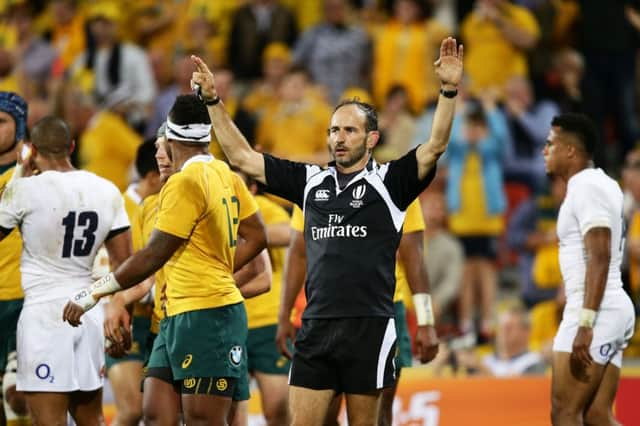Allan Massie: Beware the Pandora's Box of TV refs


Likewise tennis was transformed by the change from wooden to metal racquets with a bigger face permitting a greater degree of top-spin, and cricket by today’s heavier and thicker bats which allow mis-hits to soar over the boundary and a defensive push to go for four.
In rugby Owen Farrell, Leigh Halfpenny and Greig Laidlaw wouldn’t have achieved their remarkable record of accuracy with the old leather ball or indeed without that very simple tool – the kicking tee. Top golfers can now regularly drive the ball 50 yards further than even the longest hitters did 50 years ago and not because their swing is better, but because golf clubs, like cricket bats, are more efficient.
Advertisement
Hide AdAdvertisement
Hide AdThe use of technology is changing sport in other ways too. The football authorities are – reluctantly? – edging towards accepting video evidence, at first perhaps only to determine whether a ball may have crossed the goal-line. They should be cautious. As Ernest Bevin, the great Foreign Secretary in the 1945 Labour Government, said in another context, “once you open that Pandora’s Box, who knows what wild horses won’t jump out?” Introduce video technology for one thing and it won’t be long before the wild horses will be leaping all over the place.
This has been the case in rugby union. Video evidence was first permitted to determine whether the ball had been properly grounded in the attempt to score a try. “Fair enough”, most people thought, even while in the amateur club game amateur referees decided that question for themselves every week without recourse to television.
Gradually, but not that slowly, more and more questions were referred to the TV referee, as the on-field referee, who is still, according to the Laws, the sole judge of fact, asked his colleague to track back in time to make sure that some offence hadn’t been committed in the run-up to the try.
One consequence was that referees became ever less ready to trust their own judgment, being confident that they could appeal to their colleague to clarify any doubt they might have had. There was a ridiculous example in the Connacht-Glasgow semi-final in May. Connacht scored what looked like a brilliant long-range try. Having checked that the ball had been properly grounded, the referee then asked his TV colleague to check whether there had been a knock-on at the beginning of the movement. Indeed there had been – a tiny nudge forward as the player gathered a low pass. So the try was disallowed. Twenty years ago the referee, suspecting a knock-on, would probably have blown his whistle.
Reliance on technology has had two other deplorable results. First, matches now commonly last at least 100 minutes rather than 80, because of the numerous occasions on which the referee says “time off”. This is a bore. Add in the excessively long half-time interval, 15 minutes during which players disappear to the dressing-room rather than five during which they used to remain on the field, and it’s now usual for two hours to elapse between kick-off and final whistle. Second, coupled with the use of substitutes, the frequent pauses in the action while attention is turned to the screen, mean that players have periods of recuperation which in turn means that there are fewer tired players in the last quarter of the game, and so fewer gaps in the defences. So technology may make for boredom.
As it happens, one of the most entertaining matches I watched last season was the French Top 14 final between Racing and Toulon. It was a terrific game, nail-biting stuff, but it was only after the final whistle that I realised that it had been so pleasing and exciting simply because the referee had had the self-confidence to trust his own judgement and completely ignored his colleague in front of the TV screen.
So football fans should be warned. Open the Pandora’s technology-box and your game will change. It will be interrupted time and again as the referee, knowing he will be castigated for any mistake, looks to higher authority to make decisions for him. The game will stop while every dubious tackle is scrutinised. Any goal scored from a corner will not be awarded until the TV referee is satisfied there has been no interference or obstruction; and your 90-minute match will stretch out to last two hours. Those who call for the use of video evidence should be warned. They may get what they ask for – and regret it.